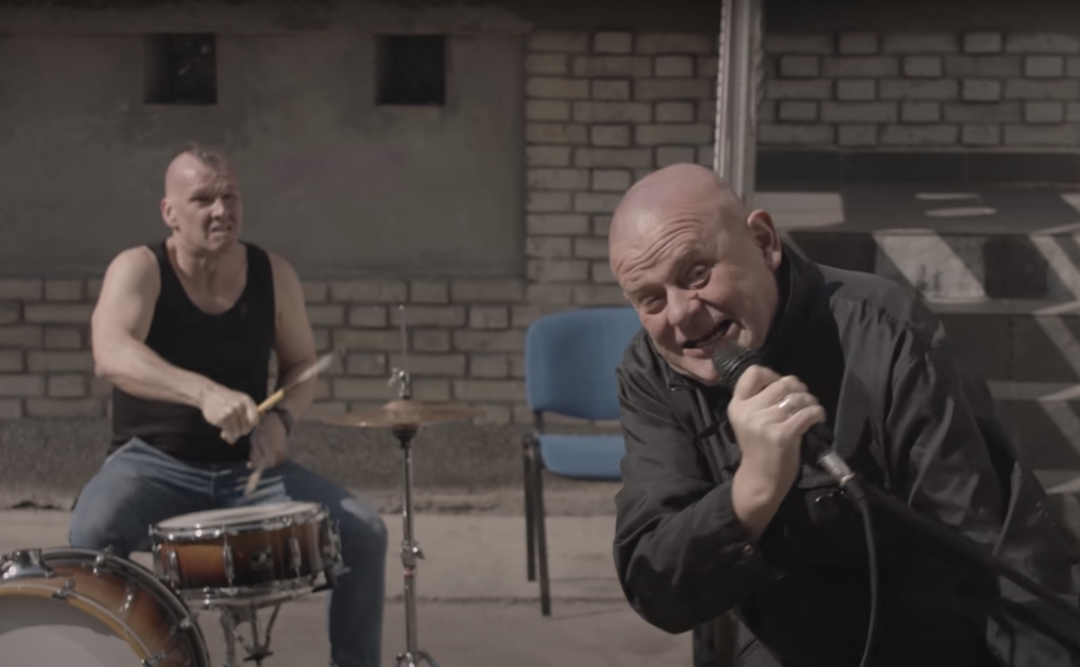Polish public radio is embroiled in controversy regarding alleged censorship of a song criticising the ruling Law and Justice party (PiS) chairman Jarosław Kaczyński. The affair has prompted protests and resignations from employees, boycotts of the station by musicians, as well as condemnation from all sides of the political spectrum.
On Friday, veteran musician Kazik Staszewski’s song “Twój ból jest lepszy niż mój” (“Your pain is better than mine”) was announced as the number one single in Polish Radio Three’s influential music chart on Friday, only for links to the chart and news about the song to be disabled on the programme’s website shortly after the broadcast ended.
The song, a collaboration with Wojtek Jabłoński, complains about the tenth anniversary of the Smolensk disaster on 10 April this year, when a number of ruling party politicians were criticised for their apparent failure to observe restrictions on public gatherings while attending the memorial.
It is specifically seen as a criticism of Kaczyński, Poland’s de facto leader and whose twin brother, President Lech Kaczyński, died in the Smolensk crash. Jarosław Kaczyński played the central role in the commemorative events on 10 April and also visited his mother’s grave despite the cemetery being closed to other members of the public during lockdown.
In the song, Staszewski, best known as the frontman of rock band Kult, comments that seemingly only one person with a limousine was allowed to “ease his pain”, while others were left unable to mourn. Although Kaczyński is not mentioned by name, the allusion is clear.
Cemeteries closed as a result of the events / Of recent weeks, recent events / I look at the chains / I wipe away my tears / Just like you, just like you
The gate opens / I can’t believe my eyes / Perhaps things are different after all / I run over, your heavies shout “stop” / Because your pain is better than mine
The removal of the song from Polish Radio’s website prompted widespread criticism on Friday, with some likening it to the kind of censorship that took place in Poland under communism. The current government has long been criticised for the politicisation of state media, which it has used to present its message and attack opponents.
The head of the radio station, Tomasz Kowalczewski, gave two explanations for the decision to remove references to the chart over the weekend. He said that the rules had been broken by adding a song from outside the list, and then that the presenter had manipulated the chart to move Kazik’s song from fourth to first place.
“We now know for sure that manual manipulation took place, involving changing the order of the songs that Radio Three’s listeners voted for,” said Kowalczewski in a statement quoted by TVP Info.
“We are sorry for this situation and therefore apologise to the listeners of the Radio Three Chart for annulling the last ranking. Kazik Staszewski’s songs, even the most political ones, have always been played on our station, and there is no reason for that to change.”
But most commentators were not convinced by the denials of censorship. The presenter in question, Marek Niedźwiecki, reportedly resigned from the station after 35 years in protest. Composer Zbigniew Preisner announced the popular DJ’s decision, adding: “Our Radio Three no longer exists. We cannot allow ourselves to be enslaved by this Bolshevik politics, we must defend our freedom.”
Niedźwiecki was joined by fellow DJs Hirek Wrona and Marcin Kydryński, who announced on his programme “Siesta” on Sunday that it would be the last edition, saying that after three decades of presenting the “don’t recognise [the station] any more”.
A number of Polish musicians also protested, among them the popular singer-songwriter Dawid Podsiadło, Poland’s best-selling artist of 2019, who announced on his Facebook page that he did not want the station to play his songs.
“It is hard to look at the latest example of demolition of culture without emotion,” wrote Podsiadło. “Radio Three always had a special place in my heart, and as long as I’ve been alive I’ve been hearing about the existence of [its] cult chart.”
Other musicians, including Organek, Kayah, Artur Rojek, Muniek Staszczyk, Sorry Boys, Krzysztof Zalewski, Maria Peszek, and Fisz, declared they would be boycotting Radio Three, reports Viva.pl.
Opposition politicians and commentators blamed the ruling party for creating an atmosphere in which state media feel obliged to censor content. But government ministers and other senior PiS figures also joined the criticism of Polish Radio’s decision.
PiS deputy leader and MEP Joachim Brudziński said, while “attacking” Kaczyński at such a time was “barbaric”, removing information about the number one single was “either a manifestation of stupidity or somebody’s ill will”, adding that “in a free country an artist has the right to his (sometimes unwise) interpretation of events”.
Culture minister Piotr Gliński agreed, writing that “at times some artists write rubbish. Even shocking. But even more shocking is taking down a song for ‘wrongmindedness’. It must be some kind of provocation”.
Zgadzam się z @jbrudzinski. Zdarza się, że niektórzy artyści śpiewają głupstwa. Nawet bulwersujące. Ale jednak bardziej bulwersujące jest zdejmowanie piosenki za „nieprawomyślność”. To chyba jakaś prowokacja. 1/2
— Piotr Gliński (@PiotrGlinski) May 16, 2020
Development minister Jadwiga Emilewicz wrote to the National Media Council, a state body that oversees public media, demanding an explanation. She drew parallels to an example of censorship from 1984.
“Artistic freedom should never be fettered in any way, even when the artist has a different opinion and perceives reality differently,” wrote Emilewicz, quoted by Wirtualna Polska.
But Prime Minister Mateusz Morawiecki refused to join the chorus of condemnation, writing on Facebook that the controversy was a “red herring”, a less important topic than other issues.
Main image credit: YouTube

Ben Koschalka is a translator, lecturer, and senior editor at Notes from Poland. Originally from Britain, he has lived in Kraków since 2005.




















